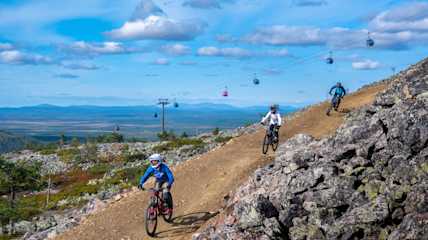
Are there mosquitoes in Lapland in summer?
These tips will ensure you get the most out of your summer visit to Levi without the unnecessary fear of mosquitoes and other insects.
The summer and the nightless night in Lapland is the perfect time for unforgettable experiences. In Levi, you can enjoy a summer holiday in a unique environment, as long as you are aware of a few key principles for outdoor activities in Lapland.
In Lapland, the 'räkkä' season varies from year to year
Mosquitoes, midges, gnats, blackflies and horseflies. Reindeer, birds, other animals and humans. These are all closely intertwined in the summer in Lapland, especially during the 'räkkä' season.
Räkkä is the period in Lapland's summer when the air is most full of flying insects. Räkkä varies from year to year depending on the prevailing weather conditions. In typical summer, the räkkä season starts around Midsummer and continues until the end of July. A humid and hot early summer brings forward the emergence of mosquitoes, while drought slows down the mass emergence of flying insects.
The main reason for this mass emergence of insects is the intense nature of the Lapland summer – after a long winter, nature comes alive in full force as a result of the constant light, heat and humidity. The hectic bustle, in turn, comes to an end as light levels fall and temperatures drop.
Is it just a nuisance for humans and animals, or do the abundant insects also have their benefits? From nature's point of view, yes. The abundance of insects attracts a large number of birds to nest in Lapland in summer. Insects of all kinds also guide the movements of reindeer herds – to open fells and other open places, which also makes it much easier to mark their calves.
How to prepare for mosquitoes in Levi – 4 tips
For the majority of summer visitors to Lapland, insects are not a problem. But if you're afraid of mosquitoes, the following tips will help you minimise the hassle.
1. Dress right for summer
Light-coloured, long-sleeved and baggy clothes work well in the räkkä season. When the weather allows, layering – wearing several layers of protective clothing – can also help protect against mosquitoes. A hooded jacket also provides comfort and protection when outdoors. So do long socks and sturdy boots. A cap or other headgear tops off the outfit. For those visiting Lapland in summer, a separate mosquito hat with netting to protect the head area also provides comfort and protection.
2. Use repellents if needed
There are several different insect repellents against insects and bugs. Some rely on sprays, while others rely on roll-on style products. Burnable mosquito repellents, on the other hand, work in a specific environment, such as on the terrace of a cottage. The smoke from a campfire also helps to keep mosquitoes away.
3. Go with the wind
A sheltered, damp spot in the forest is the perfect place to encounter a wide variety of bugs. To keep mosquitoes and other bugs at a reasonable level, avoid bogs and other wetlands during the worst of the räkkä season. Likewise, avoid dense forests where there is little wind. A good tip is to head for an open fell or other sufficiently open place where the wind will keep the mosquitoes at bay. The bonus is often spectacular scenery to enjoy.
4. Take your mind elsewhere with activities
Levi offers a wide range of experiences and activities, even in summer. You're less likely to pay attention to the mosquitoes while doing something that really interests you. Hiking and berry picking are summer favourites for many. Cycling at a good pace will keep insects at bay,. Regardless of the season, Levi's guided tours and experiences are usually in great places where mosquitoes are not a nuisance.








